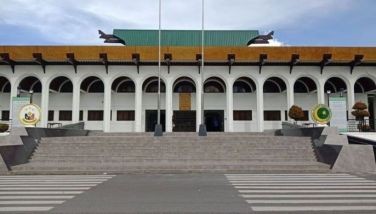Poor Pinoy villagers to get US ‘Mercy’
May 12, 2006 | 12:00am
WASHINGTON — The US Navy hospital ship, Mercy, will visit various areas of the Philippines, including Zamboanga, Tawi-Tawi and Sulu, for one month from May 25 to provide medical assistance to poor people, said Adm. Gary Roughhead, commander of the US Pacific Fleet.
And just in case terrorists operating in the region have any ideas that could compromise the safety of the ship, Roughhead said, "Not only are we getting support from the host nation, but this ship also has a force protection capability on board should it be required."
He declined to go into details, except to say, "We will be well protected."
The US State Department last month expressed concern over what it said was growing cooperation among Islamist terrorist organizations operating in the Philippines — the Abu Sayyaf group, the Jemaah Islamiyah and the Rajah Sulaiman Movement.
The Philippines is the first leg of USNS Mercy’s five-month long humanitarian assistance mission to Southeast Asia. She will also visit Indonesia, Bangladesh and East Timor.
Details of the ship’s deployment in the Philippines and who will be able to avail themselves of medical assistance are still being worked out with non-government organizations on the ground and the ship’s advance team, Roughhead told a press conference in Washington on Wednesday.
A crew of doctors, dentists and nurses will provide basic medical evaluation and treatment, dental and optometry screenings, eyewear distribution, preventive medicine treatment and general and ophthalmology surgery to men, women and children in villages normally lacking access to such treatment, he said.
Asked how the Pacific Fleet is addressing cross-border movements of terrorists like the Indonesian-based Jemaah Islamiyah, particularly in the Sulawesi Sea area, Roughhead said the United States and its partners in the region are working on "maritime security initiatives all focused on ensuring that we share a common view of what is moving on the oceans (and) what is moving on the waters in the region."
There will be a series of exercises called CARAT or Cooperation Afloat Readiness and Training this summer, he said.
There will also be a multinational naval exercise at the end of this month called SEACAT, or Southeast Asian Cooperative for Anti-Terrorism.
Roughhead said non-government organizations assisting the USNS Mercy during its deployment in the Philippines will include the Aloha Medical Mission and Project Hope, both US-based, and the Tzu-Chi Foundation, Save the Children, Philippine National Red Cross and the Sahaya Foundation.
As the ship moves from location to location, there will be changes in the participants from the individual NGOs as well as the NGOs themselves because many of the volunteers will only be able to serve for short periods of time, he said.
And just in case terrorists operating in the region have any ideas that could compromise the safety of the ship, Roughhead said, "Not only are we getting support from the host nation, but this ship also has a force protection capability on board should it be required."
He declined to go into details, except to say, "We will be well protected."
The US State Department last month expressed concern over what it said was growing cooperation among Islamist terrorist organizations operating in the Philippines — the Abu Sayyaf group, the Jemaah Islamiyah and the Rajah Sulaiman Movement.
The Philippines is the first leg of USNS Mercy’s five-month long humanitarian assistance mission to Southeast Asia. She will also visit Indonesia, Bangladesh and East Timor.
Details of the ship’s deployment in the Philippines and who will be able to avail themselves of medical assistance are still being worked out with non-government organizations on the ground and the ship’s advance team, Roughhead told a press conference in Washington on Wednesday.
A crew of doctors, dentists and nurses will provide basic medical evaluation and treatment, dental and optometry screenings, eyewear distribution, preventive medicine treatment and general and ophthalmology surgery to men, women and children in villages normally lacking access to such treatment, he said.
Asked how the Pacific Fleet is addressing cross-border movements of terrorists like the Indonesian-based Jemaah Islamiyah, particularly in the Sulawesi Sea area, Roughhead said the United States and its partners in the region are working on "maritime security initiatives all focused on ensuring that we share a common view of what is moving on the oceans (and) what is moving on the waters in the region."
There will be a series of exercises called CARAT or Cooperation Afloat Readiness and Training this summer, he said.
There will also be a multinational naval exercise at the end of this month called SEACAT, or Southeast Asian Cooperative for Anti-Terrorism.
Roughhead said non-government organizations assisting the USNS Mercy during its deployment in the Philippines will include the Aloha Medical Mission and Project Hope, both US-based, and the Tzu-Chi Foundation, Save the Children, Philippine National Red Cross and the Sahaya Foundation.
As the ship moves from location to location, there will be changes in the participants from the individual NGOs as well as the NGOs themselves because many of the volunteers will only be able to serve for short periods of time, he said.
BrandSpace Articles
<
>
- Latest
- Trending
Trending
Latest
Trending
Latest
Recommended





























